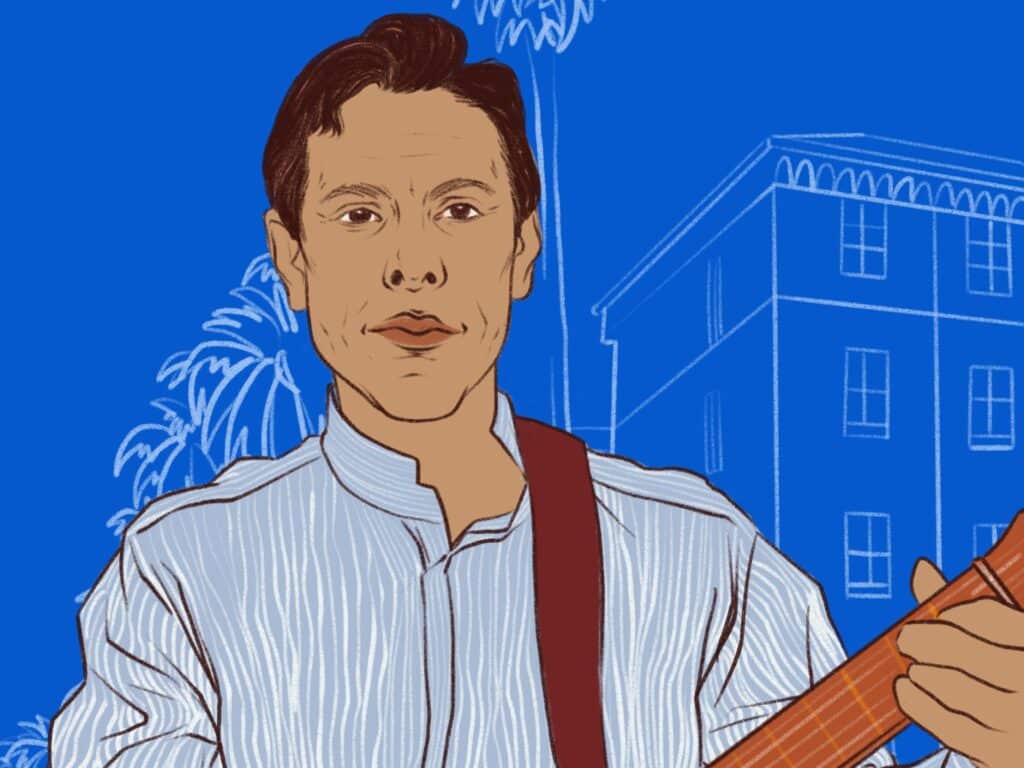Ask Quetzal Flores who his inspirations are, and he’ll rattle off a list of household names, people who sit at the intersection of social justice and cultural influence: Audre Lorde, Stevie Wonder, James Baldwin.
And then there are the inspirations directly from his East Los Angeles home base: His parents and his grandparents. “My parents are still involved in the movement,” Flores says, noting that everything he knows about community building and organizing began right under his roof.
With every Flores generation comes a mission. Flores has several intersecting advocacies that coalesce in the work of the Community Power Collective: Bringing restorative justice practices to East L.A., building community through music and art, and empowering the community to not only work together within itself, but to protect itself from outside external forces — namely economic ones that can make life more difficult.
“East L.A. is one of those communities that’s been systematically defunded, policed to the hilt, and fractured many times over with freeways and so-called development,” Flores says. “Still, you have a community of people that are carrying deep roots that can create sanctuary and come together and support each other and support other people. It’s not perfect, but it certainly is our home, and it feels like home. It feels like safety.”
“It’s not perfect, but it certainly is our home, and it feels like home. It feels like safety.”
That vision of sanctuary — rooted in joy, art, culture and accountability — is central to Flores’ approach. As a musician, organizer and cultural strategist, he challenges traditional models of movement building. He believes organizing work must begin with shared humanity — moments of collective joy, vulnerability, creativity and visioning. For Flores, it’s not only about resisting harm; it’s about imagining and building something better.
One of his approaches is collective songwriting, which he uses as a method for communities to name their dreams and to articulate the policies they need, the neighborhoods they deserve, and the culture they refuse to relinquish in the face of gentrification and displacement.
As the frontman of the band Quetzal, winner of a 2013 Grammy Award, Flores has long used music to express political passion and cultural resilience. Whether blending son jarocho with funk and Cuban charanga or performing on stages as large as Carnegie Hall, his artistry carries the soul of his community.
Sustaining the movement also means embracing evolution. But evolution entails hard conversations and assessments of community norms that should be decentralized or abolished entirely — including, but not limited to, patriarchy, racism and ageism.
“Each one of our values is a call to accountability,” Flores says. “We’re not perfect, you know. We are gonna trip up and make mistakes individually and collectively, but this is a part of culture for us. How do we confront the parts of our culture that are so toxic and so harmful? Without confronting them, we cannot continue to be in movement.”
“Each one of our values is a call to accountability.”
Flores’ organization, supported in part by Kresge’s Arts & Culture Program, is entirely led by women of color.
“One of our core values is feminism — a very particular type of feminism, based in emergent feminism,” Flores adds. Emergent feminist principles are rooted in response to changing societal norms, while examining intersections of gender with race, class and sexuality.
“I’ll say that the women that I work with — the down-home señoras — are just brilliant, and they talk about losing the fear we often talk about. They’re like, ‘Oh you know, you just have to lose the fear, and I’m like, ‘Yo, that is the example, so often times I follow them wherever they want to go, and this is how my work now emerges — it’s from their cues,” Flores says.
Flores says he sets an example for his 20-year-old child, who he also takes cues from. It’s part of the generational tradition of passing along the work.
“My parents are very, very proud of me and it makes me very emotional because I love them so much,” he says. “They’ve been at it for so long and given their lives to it. To hear my mom say she’s proud of me…and my dad, too? And they more than tell me, they show me.”
“To hear my mom say she’s proud of me…and my dad, too? And they more than tell me, they show me.”


